The American Soldier who Fought for France
Eugene Bullard was an African American who fled discrimination in the United States and ended up fighting for France during World War One. While the Americans turned their backs on him, the French honoured him as a hero of their own.
A new exhibition opened on May 25th at the Verdun Memorial museum, situated on the edge of the former battlefield, bringing to light – and to sound – the destinies of the women and men who lived through the horrific 1916 Verdun battle. Destins de Verduns allows for visitors to listen to the stories of French and German soldiers or civilians whose lives were upturned by the conflict that took place in the Meuse. One American soldier is also present among those remembered. His incredible story is as heart-wrenching as it is fascinating.
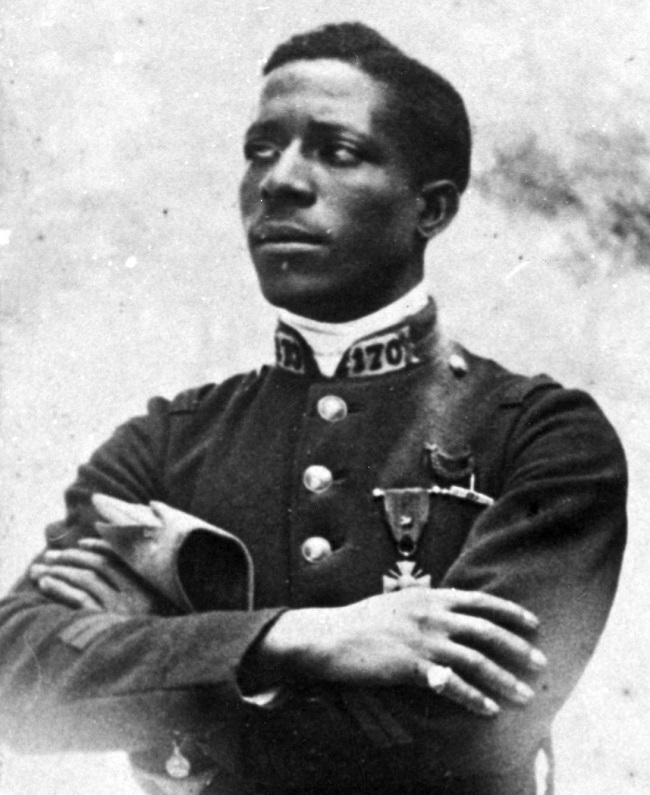
Eugene Bullard was one of the first African American pilots
Fleeing discrimination only to fall into war
Eugene Bullard was born in 1895 in Columbus, Georgia. Though slavery had been abolished 30 years before, racial discrimination was omnipresent in this southern American state and little Eugene watched as his father was almost lynch by a white mob. The young boy was told stories of Europe where black and white people lived in harmony and set upon crossing the Atlantic.
At 16, he arrived in France, the country of his dreams, where a few odd jobs eventually led him to become a boxer, having trained in England already.
1914 came along and with it, the First World War. Eugene aged himself and enlisted with the Foreign Legion to fight alongside the French. He fought in the Somme and the Champagne and was awarded the War Cross but eventually, the 170th Infantry Regiment in which he served was sent to the hell of Verdun in 1916, a bloody battle that lasted nearly a year. In March 1916, he was injured and discharged but his devotion to fighting for France did not waver.
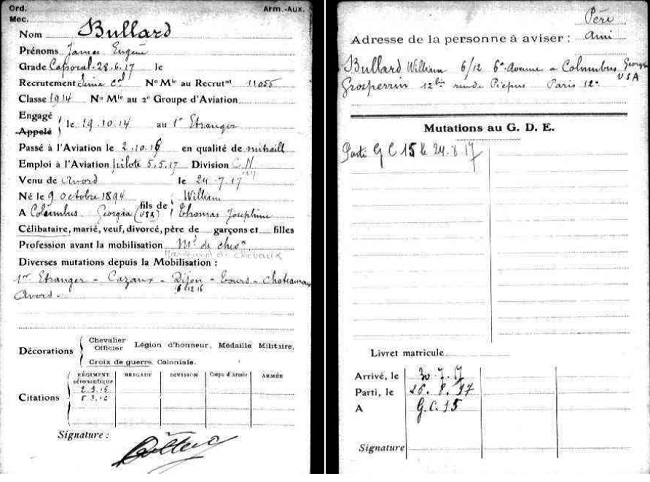
Eugene’s Croix de Guerre award
The first black fighter pilot in France
He may have been held away from the trenches with his comrades in arms, the Poilus, this didn’t stop Eugene. He joined the French air service, then in its infancy, as an air gunner and graduated as a pilot in May 1917, thus becoming one of the first African American fighter pilots in history and certainly the first in the French army. He joined the Lafayette Flying Corps along with other Americans flying for France. Made corporal, he fought in the air during that summer until November 1917, striking two enemy planes down, earning him the nickname ‘l’Hirondelle noire de la mort’ (lit. The Black Swallow of Death). His motto “All blood runs red” was engraved on his plane.
In the meantime, the United States entered the fray and Eugene, answering the call of the US army asking all American pilots already fighting in France to join the American ranks and hoping to fight for his country of birth, tried to enlist with the US Air Force. But he was turned down: the American military simply could not accept having a black officer outrank and potentially give orders to white soldiers (pilots automatically earn the rank of officer).
A doctor used the excuse of an altercation between Eugene and a French soldier who’d made a racist remark, to kick him out of the air force. An ex-pilot, he was sent behind the lines where he finished the war still serving the French.
Read More: What to See and Do on the Remembrance Trail
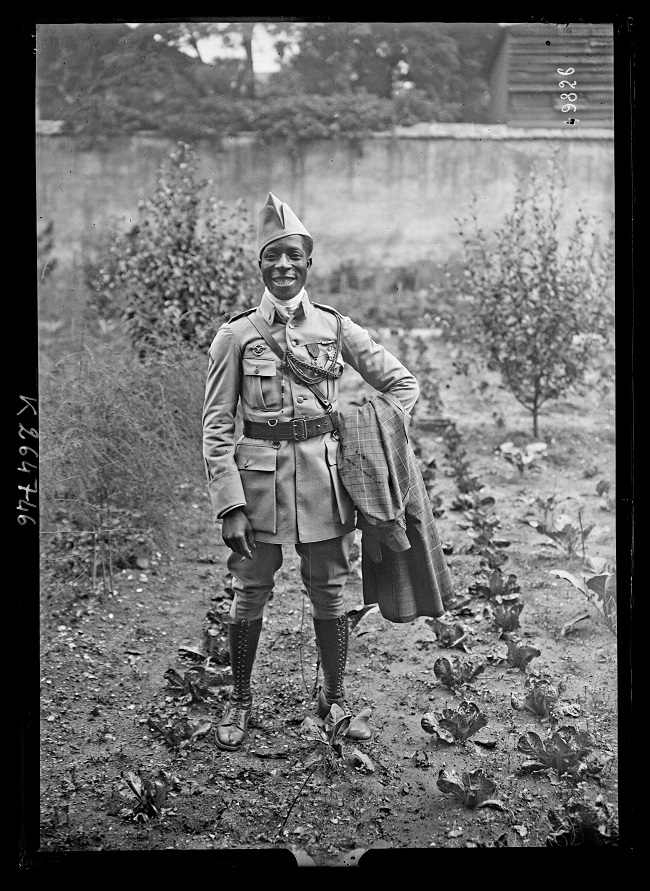
Eugene served first in the Foreign Legion in the Infantry © Bibliothèque nationale de France
The jazzman dazzling Pigalle
After the war, a new kind of music began wafting out of clubs and cafés in France: jazz, brought over to Europe by the American troops. Eugene loved music. He became a jazzman and performed as a drummer in the Parisian clubs. His reputation grew and as he began to earn money, he was able to buy Le Grand Duc, a club in Pigalle. He frequented great figures of the entertainment industry such as Josephine Baker or Louis Armstrong and his fame grew in Paris.
Later, he opened another bar, L’Escadrille, and a gym and physical wellness centre.
On the eve of World War II, he was briefly an informant for French counter espionage because he spoke German and could spy on German officers who came to his club. War broke again and, aged 45, he joined the ranks of the French army once again and fought for France. Injured, he was repatriated the States in the summer of 1940. He garnered support for France through the Gaullist organisation ‘France Forever’
Read More: American and International Remembrance Sites
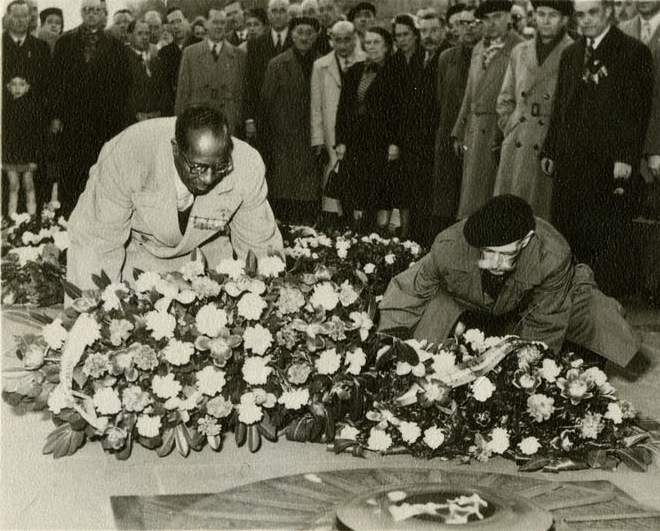
Eugene Bullard at the Tomb of the Unknown Soldier in Paris in 1954
Ignored in one country, decorated in another
After 28 years away from his country or origin, Eugene was confronted once more with segregation. The decorated soldier and ex-pilot felt like a stranger in his home country and had to resort to odd jobs again to survive. His living conditions took a turn for the worse.
He was not forgotten in France however. In 1954, the French government invited him to rekindle the ever-lasting flame on the tomb of the Unknown Soldier, along with two Frenchmen. Five years later, he was named Chevalier de la Légion d’Honneur, the highest order of merit in the country, by decision of President Charles de Gaulle who said of Eugene Bullard that he was “a true French hero”. In total, he received 14 French medals and military decorations.
Back home, in the US, Eugene was completely ignored and forgotten. The last job he had was that of an elevator operator. He died in 1961 of cancer. He was buried, in his uniform, in the French corner of the military cemetery of Flushing, in Queens, maintaining one last link to France, a nation which he loved and served.
The United States did eventually recognise this man’s incredible destiny…some 30 years after his death. As Colin Powell served as Military Chief of Staff, he rehabilitated Eugene’s name and made him sublieutenant of the US Air Force, an award which he should really have received in 1917.
Lead photo credit : Eugene Bullard © Bibliothèque nationale de France
Share to: Facebook Twitter LinkedIn Email
More in French history, remembrance, World War One
Leave a reply
Your email address will not be published. Required fields are marked *

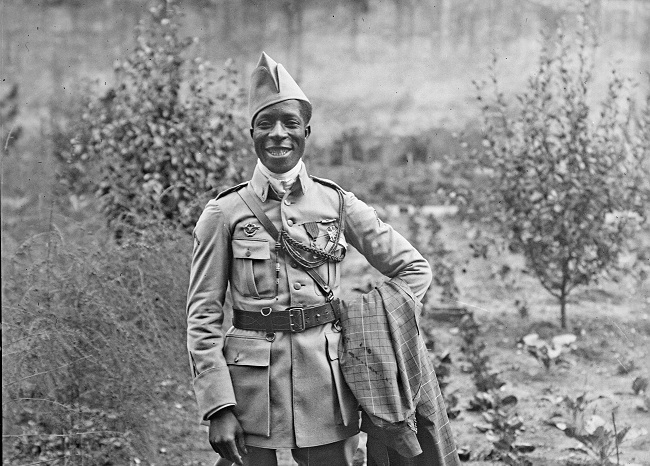


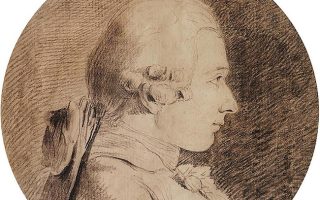

REPLY
REPLY